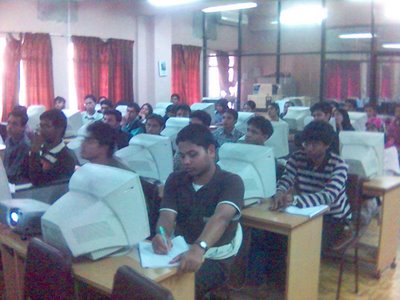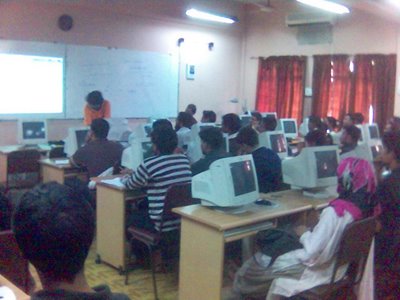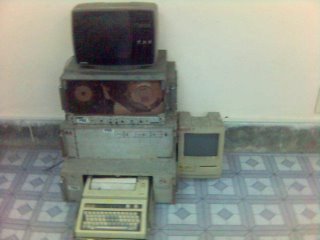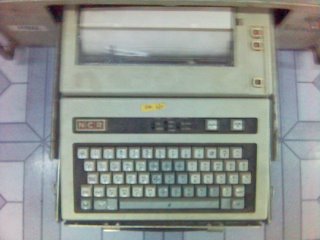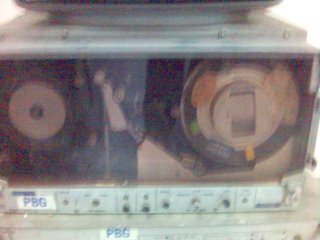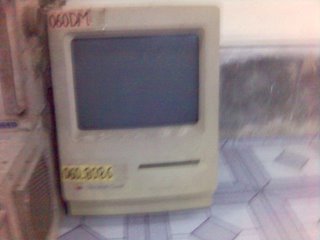We are delighted to announce that, we at the
Bangla Wikipedia project have declared August 2006 to be the Bangla Wikipedia month. Throughout the whole month, we would undertake various activities and campaigns to enhance, expand Bangla wikipedia, and also generate more awareness about it.
A few details are provided below:
1. What is Wikipedia? What is Bangla wikipedia?Wikipedia is world's largest encyclopedia, open source and free for all, created by thousands of people world wide. It has versions in more than 200 languages. The largest version, the English wikipedia (
http://en.wikipedia.org ) has more than 1.3 million articles, making it the largest encyclopedia in the world (larger than Britannica, Encarta combined). 10 other languages, including French, German, Spanish etc. have more than
100,000 articles. Many languages, even small ones like Macedonian (with only 2 million speakers) have 8,000 articles.
Anyone can add content or edit wikipedia, all you need is an Internet connection.
Bangla wikipedia is the Bangla version of wikipedia (
http://bn.wikipedia.org ). The project is to create a general encyclopedia in Bangla, constantly updated, expanded, and enhanced. Anyone with an Internet connection, and ability to view Bangla Unicode
text, can visit the page and read/edit content.
Anyone can read it, print it, and use it for whatever purpose they want. It is given away under GNU Free Documentation License, for Free! You don't have to pay hundreds of takas to access it ... anyone with an Internet connection can access it. Even now, it is the largest Bangla language website in the whole world, with more than 3675 content pages full of images, and knowledge.
2. Bangla Wikipedia project (bangla_wiki)Since late March 2006 (March 25), Bangla_wiki, a project coordinated via the mailing list
http://groups.yahoo.com/group/bangla_wiki , is working on building the encyclopedia. This is done with help from Bangladesh Open Source Network (BDOsn). The objective is to organize the people who are active in editing/contributing to Bangla wikipedia, and to solve various issues, organize public-awareness campaigns, and so on.
3. Our achievements since April 2006Bangla wikipedia was started in 2004, but it lacked contributors and content. Since starting the campaign in late March 2006, the Bangla_wiki project has been able to add 3200 new articles , that is, 800 new articles per month. The total article count in Bangla wikipedia is now at 3675. Through campaign, we have been able to organize a diverse
group of contributors, spread all across the globe, and from both Bangladesh and West Bengal.
When we started, the position of the Bangla wikipedia among all languages was 95. However, we have been able to raise our rank up to 69 as of last month (67 on August 3) and gradually rising.
4. Our immediate target: (10 - 1)BBC Bengali covered our project in May 2, 2006, and we expressed our immediate goal, of generating 10,000 articles by May 2007, and at least 1000 full length articles. Since wikipedia is a collaborative process, articles are constantly edited, expanded, and enhanced. Each article is begun as a few lines, but gradually grow up to full length.
We plan to achieve our target : 10-1, i.e. 10,000 articles, and 1000 high quality articles in 12 months. With the rate of 800 or more articles per month, we are right on course.
5. What you can do?Participate!! We need more people to edit, spellcheck, enhance, translate, and so on. Wikipedia is built by volunteers, and is provided to the whole world as a free source of content. Bangla is our mother tongue, and it is our duty to preserve the knowledge of the
world in Bangla language, so that the children of tomorrow will be enlightened.
Knowledge, unlike money, grows when it is given away, so each sentence, each bit of information you add to wikipedia will grow many times.
- To participate, you can visit http://bn.wikipedia.org and start editing. You can and should sign up, that gives some additional benefits, and takes at most 15 seconds.
- To view Bangla unicode, and type in Bangla easily, you can get Bangla typing systems like Avro , or Avro (mirror), or Shabdik, Ekushey.
- Do you have to be a scholar or specialist?? NO!! Your enthusiasm and love for Bangla are all you need. Just add information you know, with a link to the source ... but in any case, don't worry, we can guide you into adding information there. Once you join the Bangla wikipedia, an administrator will provide you with the guidelines on how to edit, what the policies are, etc.
- You can also sign up in the group Bangla_wiki. If you have any problems, you can post there.
- For a quick tutorial in Bangla, about how to edit in Bangla wikipedia, you can view http://www.ragibhasan.com/wikipedia . This has some info on basic syntax, which you can learn in about 5 minutes. Note that even if you haven't set up Bangla unicode yet, you can check this tutorial.
So, please, come join us, in this project to make a strong presence of Bangla language in the Internet.
6. Month long Programme for Bangla Wiki As mentioned earlier, we have declared August 2006 as the Bangla wikipedia month. Under this programme, we, the Bangla_wiki project will do the following:
Proposed ProgrammeA. We will observe declare the last Saturday of the month as the "Bangla Wikipedia Day" , and have day long activities to promote Bangla wikipedia.
B. Campaign: Generate public awareness about the free open source Bangla encyclopedia, collecting open content such as images / photos of the sights and sounds of Bangladesh.
C. Camp/Workshop: Organize camps and workshops about how to edit/contribute to the Bangla wikipedia. This will be done in various universities
D. Publication of booklet/leaflet: Free Booklets will be published and distributed, detailing how to edit and contribute to Bangla wikipedia.
E. Publishing articles in electronic and print media
F. Opening a wiki hub to support the wikipedian: Many people in Bangladesh do not have regular Internet access. To allow them to contribute, their content can be emailed to us, or sent by post to the Bangladesh Open Source Network office (address to be provided soon). This way, we can allow everyone to participate.
G. The existing bangla wikipedians will edit/write at least 2 edits/day or 50/edits per month.
Let's show our love for Bangla, and make Bangla wikipedia the largest repository of knowledge in Bangla language.
